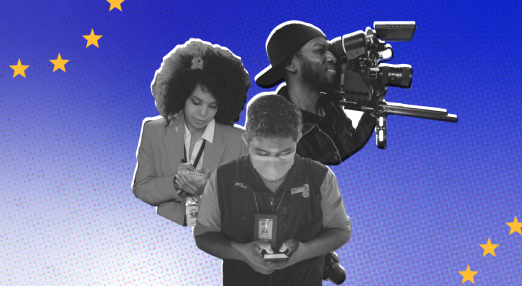EDRi-gram
Filter by...
-

The European Media Freedom Act: a unique opportunity to safeguard Europe’s media and democratic values
Media independence, freedom and plurality are under pressure in the EU. The upcoming European Media Freedom Act (EMFA) is a unique opportunity to protect Europe’s media and, by ensuring a diverse information ecosystem, also safeguarding EU democratic values.
Read more
-

EDRi-gram, 8 June 2022
In this edition of the EDRi-gram, EDRi and over 70 civil society organisations and professional bodies urge the European Commission to withdraw the CSA Regulation and call for an alternative that is compatible with the European Union's fundamental rights. The European Commission needs to understand that playing with online privacy and security affects everyone, including the very children it is supposed to help. Join us in our efforts to protect encrypted communications, open internet spaces and online anonymity.
Read more
-

EDRi-gram, 25 May 2022
In this edition of the EDRi-gram, we urge the European Parliament to make good use of the chance that the AI Act offers to regulate harmful border technologies and truly protect people on the move. We also dive deeper in the needy-greedy details of the European Commission's recent proposal for a ‘Regulation laying down rules to prevent and combat child sexual abuse’ which creates major risks to the privacy, security and integrity of private communications, not just in the EU, but globally.
Read more
-

EDRi-gram, 4 May 2022
In this edition of the EDRi-gram, we urge the European Parliament to vote down the expansion of Europol's powers to prevent the enabling of mass surveillance. We also explore what could go wrong when a billionaire decides to buy one of the largest social media platforms. Join us in celebrating the success of EDRi member Defesa dos Direitos Digitais who got the Portuguese Constitutional Court to declare the unconstitutionality of the Portuguese data retention law.
Read more
-

EDRi-gram, 20 April 2022
In this edition of the EDRi-gram, we look at how you can influence the AI Act in order to ban biometric mass surveillance across Europe. We also raise our concerns with the new Cybercrime Protocol which threatens to undermine our privacy to compensate for the rising powers of law enforcement authorities. Don't miss out to learn who the biggest data sinners of the last year are, join the German Big Brother Awards 2022. In previous years, the Big Brother Awards have placed a spotlight on threats to privacy and basic rights, including loyalty cards, credit scoring, toll cameras, colour photocopiers or mobile phone surveillance.
Read more
-

EDRi-gram, 6 April 2022
In this edition of the EDRi-gram, we look at what the facial recognition company Clearview AI is doing with our faces in the Ukrainian war and how we can put stop the private company from exploiting the war. We also urge the French Council Presidency to follow through on its promise to ensure that a final deal on the DSA prohibits the use of sensitive data, including the drawing of inferences about a person’s sensitive characteristics, to display advertisements.
Read more
-

EDRi-gram, 23 March 2022
In this edition of the EDRi-gram, we look at the leaked opinion of the Commission which sets off alarm bells for mass surveillance of private communications. The newly-revealed opinion confirms the fears that EDRi and 39 other civil society groups recently raised about the proposal which could destroy the integrity of private online communications across the EU, and set a dangerous precedent for the world. We are also urging for real solutions to the flaws of the law guarding our data protection and privacy. Though a new record of high fines based on the GDPR was issued in 2021, people still face barriers to exercising rights like access to remedy and benefiting from a harmonised enforcement mechanism.
Read more
-

EDRi-gram, 9 March 2022
In this edition of the EDRi-gram, we voice the call of 72 civil society organisations to abolish manipulative dark patterns and creepy online ads. We are also urging the international community to provide the necessary support to Ukraine and its human rights defenders to ensure that people are protected from cyber threats.
Read more
-

EDRi-gram, 16 February 2022
In this edition of the EDRi-gram, we put EDRi's affiliate ECNL in the spotlight to take a peek at the fights they are fighting to advance our freedoms online and offline. We're also looking at a comparison between the Western Balkans countries' digital advancement and what the digitalisation of all aspects of life mean citizens' well-being. We're also exploring the Belgian authority's decision that IAB Europe’s consent pop-ups are incompatible with the GDPR, which has been confirmed by 27 data protection authorities from 20 EU countries involved in the cross-border investigation.
Read more
-

EDRi-gram, 2 February 2022
In this edition of the EDRi-gram, we dive into the secret negotiations about Europol's reform that would enable mass surveillance of people and discriminatory predictive policing. We also take a peek at the European Parliament's approval of a rights-respecting Digital Services Act and its proposal to ban the use of sensitive personal data for online ads.
Read more
-

EDRi-gram, 19 January 2022
In this first edition of the EDRi-gram for 2022, we look at how people are pushing MEPs to take the opportunity to end surveillance ads. We also explore why it is important for our health data to stay private and how the e-Evidence Regulation threatens the confidentiality of this sensitive information. We also look into what it’s like to have an algorithm as your boss through the stories of millions of people worldwide, working in the gig economy for companies like Uber, Deliveroo, Bolt & Just Eat, who are subjected to unprecedented surveillance.
Read more
-

EDRi-gram, 15 December 2021
In this last edition of the EDRi-gram for 2021, we look at the good, the bad and the ugly in the much-anticipated Digital Services Act report, approved by the European Parliament IMCO Committee this week. We also take a look back at this year of resilience, reflecting on the impact EDRi and the Reclaim Your Face coalition had on digital rights.
Read more
